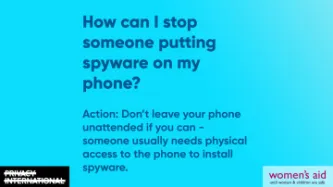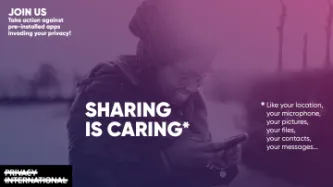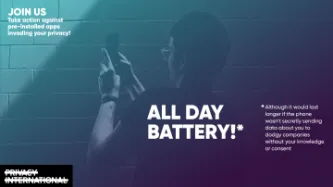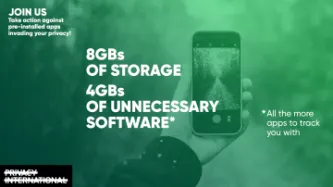Search
Content type: News & Analysis
… but also some of the bigger tech giants such as Google, Microsoft and Amazon are involved at different, … particularly concerning when some of these companies, like Google or the global surveillance industry, are infamous for …
Content type: Video
… you normally find your podcasts: Spotify Apple podcasts Google podcasts Castbox Overcast Pocket Casts Peertube …
Content type: News & Analysis
… help health researchers identify COVID-19 hotspots earlier. Google , which gathers detailed location data from millions of people who use Android phones and some Google apps will be publishing Community Mobility Reports … parks, transit stations, workplaces, and residential. Google's response to supporting government efforts, includes …
Content type: Examples
… Technology or Technique Bluetooth Hacking IoT Malware Google Android Learn more Cyber Security Smartphones Target Profile Google What PI is calling for Security for all There should …
Content type: Case Study
… getting access to their contacts, their messages, their google searches, their location and more - all without them …
Content type: Video
… you normally find your podcasts: Spotify Apple podcasts Google podcasts Castbox Overcast Pocket Casts Peertube …
Content type: Examples
… app in development relies partly on location data that Google already stores for its account holders; anonymised … data and Covid-19 Location Metadata GPS Apps Social media Google Our campaign Fighting the Global Covid-19 Power-Grab …
Content type: Examples
… between mid-February and mid-March. Other companies such as Google and Apple, may also be able to contribute insights … and Covid-19 Location Metadata Apps Social media Facebook Google Our campaign Fighting the Global Covid-19 Power-Grab …
Content type: Examples
… the White House that includes technology giants such as Google, Facebook, and Amazon, as well as lesser-known names … Facial recognition Location Metadata GPS Amazon Facebook Google Palantir Our campaign Fighting the Global Covid-19 …
Content type: Examples
… is being carried out at no charge by developers from Google, Telefónica, Ferrovial, Goggo Network, Carto, … and Covid-19 Self-assessment apps Self-declaration GPS Google Our campaign Fighting the Global Covid-19 Power-Grab …
Content type: Examples
… help people self-diagnose rather than going to a hospital, Google pulled it from the Play Store apparently suspecting … true that developer accounts from Iran are not allowed on Google Play. The app, which is still available through the … tps://www.businessinsider.com/iran-coronavirus-app-pulled-by-google-2020-3?r=US&IR=T …
Content type: Examples
… on March was a test-finding tool being built by 1,700 Google engineers. The beta version of the site was clearly limited: it was English-only, required a Google log-in, and required users to give consent to share … company's health care and technology partners. In response, Google announced it would provide a national website with …
Content type: Examples
… spread. As part of the efforts to combat the problem, Google announced a new 24-hour incident response team … Tracking the Global Response to COVID-19 Misinformation Google Our campaign Fighting the Global Covid-19 Power-Grab Target Profile Google …
Content type: Video
… you normally find your podcasts: Spotify Apple podcasts Google podcasts Castbox Overcast Pocket Casts Peertube …
Content type: Long Read
… these apps. In a study on reproductive health apps on Google Play Store, Lupton (2014) finds that products …
Content type: Video
… why 53 organisations from all over the world are telling Google it's time they take action on pre-installed apps … why 53 organisations from all over the world are telling Google it's time they take action on pre-installed apps … you normally find your podcasts: Spotify Apple podcasts Google podcasts Castbox Overcast Pocket Casts Peertube …
Content type: Long Read
… years in the Facebook’s Ad Library. In the same way, Google also allows political ads ---the publication of …
Content type: Report
… are shared with all remaining third parties (Facebook, Google, Amazon, Youtube). Even if such results are not …
Content type: Key Resources
… A timeline of Google's abuses of your privacy, from 2001 until now Key … 2020 Media Photo by Rahul Chakraborty on Unsplash From Google's acquisition of the Usenet archive in 2001 to walkouts in 2018 over Google's lack of respect for people's privacy in attempting …
Content type: Examples
… justice Terrorism Data sharing Government access Amazon Google Apple Learn more Protecting Civic Spaces Data …
Content type: News & Analysis
… a campaign on pre-installed apps. If you believe that Google should stop allowing manufacturers and vendors from … around the world, discovered following analysis by Google of devices to be distributed by their Android partner … and security in. Almost every manufacturer, including Google, disabled Google Play Protect without warning the …
Content type: News & Analysis
… Amnesty International, DuckDuckGo, and the ACLU are asking Google to step up, and we’re asking you to join us in … apps should have some update mechanism, preferably through Google Play and without a user account. Google should refuse to certify a device on privacy grounds, …
Content type: Advocacy
… carta al CEO de Alphabet Inc., Sundar Pichai, pidiéndole a Google que tome medidas contra el software de explotación … Play Store y sin necesidad de tener una cuenta de usuario. Google debería negarse a certificar un dispositivo por … firmando nuestra petición si cree que es hora de que Google deje de permitir la explotación. Nota: Esta carta …
Content type: Advocacy
… a letter to Alphabet Inc. CEO Sundar Pichai asking Google to take action against exploitative pre-installed … apps should have some update mechanism, preferably through Google Play and without a user account. Google should refuse to certify a device on privacy grounds, …
Content type: Advocacy
… lettre au PDG d'Alphabet Inc., Sundar Pichai, demandant à Google de prendre des mesures contre les logiciels … proposer une mise à jour systématique, de préférence via Google et sans compte d’utilisateur. Google devrait refuser toute certification à un appareil qui …
Content type: News & Analysis
… can avoid official channels through cloud companies such as Google, Apple and Microsoft. There is no check on what they … to (letters below): Amazon Apple Dropbox Facebook Fitbit Google Huawei Instagram Lyft Microsoft Samsung Slack : … @AmazonUK @Apple @AppleSupport @Dropbox @Facebook @fitbit @Google @GoogleUK @Huawei @instagram @lyft @microsoftUK …
Content type: Long Read
… messaging apps, store files with the likes of Dropbox and Google Drive, as our phones become more secure, locked … include Dropbox, Slack, Instagram, Twitter, Facebook, Google products such as My Activity, Uber and Hotmail. We … visited pages, voice search recording and translations from Google web history and view text searches conducted with …
Content type: Press release
… the most popular cloud services including WhatsApp, iCloud, Google, Facebook, Twitter and even the users actual voice …
Content type: Long Read
… even impose unfair terms for consumers. In November 2019, Google was reported to collect health data for about a year …
Content type: Advocacy
… advertising transparency on social media. Facebook, Google, Snapchat, and Twitter have taken action ( some more … Facebook provides transparency in only 17% of countries, Google in only 15%, and Twitter in only 16%. So, in …














